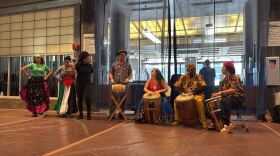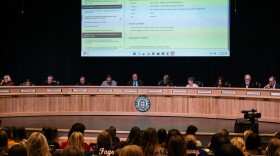Nate Hegyi is a reporter for the Mountain West News Bureau, based at KUER 90.1 in Salt Lake City. He focuses on federal land management agencies, indigenous issues, and the environment.
I'm seeing my dad cut into the neck of a dead elk for the first time.
Like me, my dad Mike Hegyi has never hunted before. He's a software engineer. But now he's wearing blue latex gloves, covered in blood, as he peels skin and fur off the animal.
"It's a lot like getting ready for smoking ribs," he says.
We're in the middle of a three-day hunting workshop in central Idaho. It's organized by a sportsmen's group called Backcountry Hunters and Anglers.
A recent survey from the U.S. Fish and Wildlife Service found that only 4 percent of Americans hunt, and that number has been dropping for decades. So Backcountry Hunters and Anglers is hosting workshops like this across the mountainous West in the hopes that more young adults will begin tracking, hunting and frying up wild game.
On day one, we spend hours inside a cold yurt watching hunting videos, learning rules and regulations and how to track elk.
On day two, we're on our hands and knees trying to butcher one.
The carcass is sprawled out on a blue tarp in a parking lot.
My dad keeps his eyes trained on the job at hand, but all I can do is stare at the dead elk's limp head lying next to my foot. There's a rank smell wafting up from its neck.
"It's probably food that's still sitting in there, partly decomposing," says Eric Crawford, an instructor and Idaho Game and Fish warden. "That's what's giving you that sour smell."
These are the kinds of smells and scenes I need to get over if I want to learn how to hunt. I grew up in Wisconsin, surrounded by classmates who would skip school to go hunting on opening weekend with their dads, sit in a tree stand and shoot deer.
But I never learned the skill from my dad. And he never learned the skill from his father, who was a Hungarian refugee. My family grew up eating meat from the Piggly Wiggly and the McDonald's we went to after school.
As I got older, however, I learned about the big carbon footprint of beef and pork. And that got me thinking about eating wild game.
Class instructor and Idaho state wildlife biologist Katie Oelrich says that's a big driver for a lot of adults who want to learn to hunt.
"There's a really strong locavore movement," she says. "Having to harvest your own animal, knowing exactly where it came from, knowing that it isn't filled with any type of chemicals."
Oelrich learned to hunt seven years ago and says it can be somewhat scary for adult newcomers.
"If your parents don't do it, it's intimidating to get into on your own," she says.
That's one reason why Oelrich began teaching the skill. Soon we're kneeling on the tarp as she removes the elk's head like she's an 1990s action star.
"The Steven Seagal head twist," she says.
Then we butcher the meat on a table and throw the scraps into a grinder. The whole animal produces about 200 pounds of lean meat.
The instructors fry up some of it in a cast iron skillet and pass it around. It tastes delicious and feels hard-won. Of course, I just helped butcher the animal.
Even though I didn't kill it, the instructors really stress the ethics behind getting this meat.
"I still have that sense, when I walk up to an animal that I just shot, of sorrow and deep respect for that animal," Crawford says. "I think if you don't have that, there's something wrong with you."
The instructors spend hours teaching us the history of hunting and how it helped form the conservation movement in the United States. Nowadays, sportsmen licenses pay for 60 percent of state wildlife agency funding.
We also learn how to kill an animal quickly and humanely. That's the part I'm most nervous about. About two-thirds of Americans have fired a gun. But though I grew up in rural Wisconsin where hunting is popular, I never have.
So on the third day of the workshop, we drive out to a shooting range. Crawford hands me a .243 Winchester rifle. It doesn't have much kickback, so it's considered a good rifle for beginner hunters. We do a couple of dry runs without ammo and then he loads a magazine.
I clumsily cycle a round into the chamber, look through the scope, aim and fire.
The sound is deafening and I instinctively close my eyes. I fire in different positions — lying prone on the ground or sitting cross-legged. I only strike the target a few times.
If I'm going to be a hunter, I'll need to become a much better shot. That will take practice, as well as getting used to a rifle. But I'm not sure whether I can actually shoot a living creature.
I ask my father if he wants to hunt.
"You know, I'm absolutely a hypocrite. I love red meat," he says. He acknowledges that he often outsources the killing of that animal to a slaughterhouse.
"I guess I'm not totally objecting to hunting — especially the ethical side of it. And if it is for harvesting meat, I think maybe I'm a little bit more open to it then I thought I was," he says.
As for me, I may just stick with fishing.
This story was produced by the Mountain West News Bureau, a collaboration between Wyoming Public Media, Boise State Public Radio in Idaho, Yellowstone Public Radio in Montana, KUER in Salt Lake City and KRCC and KUNC in Colorado.
Copyright 2018 KUER 90.1. To see more, visit KUER 90.1.






